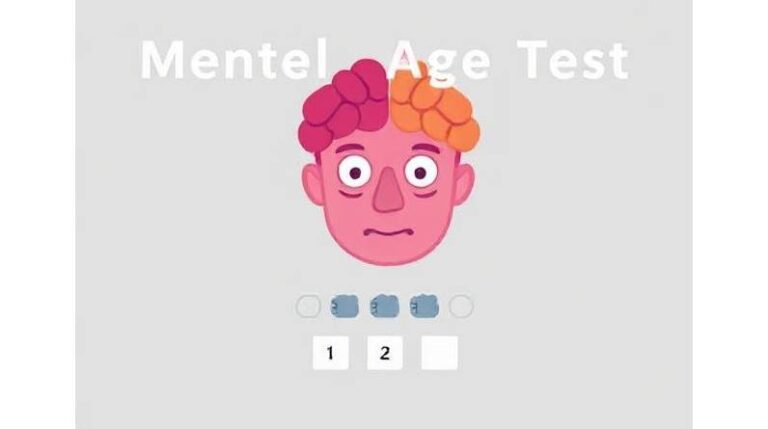We all know our age in years—but have you ever wondered how old you are in mind? The concept of mental age offers a fascinating way to look beyond your birth year and into the patterns of your personality, attitude, and behavior. A mental age test isn’t just a fun internet quiz—it can be a reflective tool, sparking insight into how we relate to the world and ourselves.
In this article, we’ll explore the origin, significance, and evolving perspective of mental age tests, going beyond surface-level entertainment. We’ll also examine how personality traits develop over time and how your mental age might actually help you make better life decisions.
What Is a Mental Age Test?
A mental age test measures how closely your thoughts, preferences, and emotional responses align with a specific age group. It’s not about IQ or how smart you are—it’s about how you relate to the world.
Not Just About Maturity
- A 25-year-old who prefers quiet nights, gardening, and National Geographic may test closer to 50.
- Meanwhile, a 60-year-old who enjoys TikTok, clubbing, and trendy memes might land closer to 20.
Your mental age reflects emotional tendencies, lifestyle choices, technology usage, and even humor preferences.
Origins: A Concept Rooted in Psychology
The idea of mental age was first introduced by Alfred Binet in 1905, during his work on what became the Stanford-Binet Intelligence Scales. Originally, the goal was to evaluate children’s intellectual development and compare it to age-based norms.
| Concept | Originator | Purpose |
| Mental Age | Alfred Binet | To assess intellectual maturity in children |
| IQ (Intelligence Quotient) | William Stern | IQ = (Mental Age / Chronological Age) × 100 |
Note: While these tools evolved into clinical diagnostics, modern online mental age tests are not scientifically validated.
Why Are Mental Age Tests So Popular?
1. Self-Discovery
People enjoy exploring how their habits and preferences stack up against societal norms.
2. Entertainment with Insight
Most mental age quizzes are designed to be humorous and exaggerated—like choosing between binge-watching cartoons or reading history books.
3. Social Comparison
The shareability factor is huge. Users love posting their results on social media, sparking playful debates and bonding moments.
A Fresh Perspective: Can Your Mental Age Influence Your Decisions?
Unlike IQ scores that measure raw cognitive ability, mental age may offer subtle cues about:
- Lifestyle alignment
- Career satisfaction
- Financial habits
- Relationship dynamics
Let’s consider this through real-life scenarios.
Example 1: Career Paths
- Mental Age 18-25: May thrive in dynamic, creative industries like design, media, or startups.
- Mental Age 35-45: Likely prefers structured environments, stability, and roles with long-term growth.
Example 2: Financial Behavior
A youthful mental age might equate to more impulse spending, while an older mental age often aligns with financial prudence and long-term planning.
How Personality Evolves With Age
Contrary to the belief that people don’t change, studies show that personality traits evolve well into adulthood.
Big Five Personality Traits and Age Trends
| Trait | Tends to Increase | Tends to Decrease |
| Conscientiousness | ✅ Yes | ❌ No |
| Agreeableness | ✅ Yes | ❌ No |
| Emotional Stability | ✅ Yes | ❌ No |
| Extraversion | Mixed | Mixed |
| Openness | Slightly | Slightly |
Study Reference: Roberts et al., University of Illinois (2018), longitudinal personality analysis over 50 years.
As you age, traits like empathy, self-discipline, and emotional balance generally improve—thus increasing your mental age in subtle ways.
How to Interpret Mental Age Results Responsibly
Mental age quizzes are not diagnostic tools. Still, they can prompt meaningful reflection—if used wisely.
What Your Result Doesn’t Mean:
- You’re more or less intelligent.
- You’re immature or overly serious.
- You’re stuck at that age.
What It Can Tell You:
- Your emotional tendencies.
- Your comfort zones and where they align generationally.
- Clues about your social energy, tech preferences, and values.
Tips for Taking a Mental Age Test Meaningfully
- Don’t overthink your answers. Go with your gut.
- Take more than one quiz to spot patterns.
- Discuss your result with a friend for outside perspective.
- Reflect—Does your result feel accurate? Surprising? Empowering?
Fun vs. Facts: The Limits of Mental Age Tests
| Feature | Mental Age Test | Clinical Assessment |
| Purpose | Entertainment & Self-Insight | Psychological Evaluation |
| Backed by Research | ❌ Mostly not | ✅ Yes |
| Uses Humor | ✅ Often | ❌ Rarely |
| Diagnoses Behavior | ❌ No | ✅ Yes |
Should You Be Concerned About a Low (or High) Mental Age?
Absolutely not.
A mental age of 16 at age 40 doesn’t mean you’re “behind”—it might reflect creativity, openness, or emotional vitality. Likewise, a high mental age at 25 may point to resilience or early maturity.
Embrace your results, but don’t let them define you.
Final Thoughts: Mental Age as a Window Into Self-Awareness
The mental age test is a playful yet thought-provoking way to understand yourself better. While not scientifically rigorous, it opens the door to introspection, encouraging us to ask:
- How do I see the world?
- What brings me joy?
- How do I handle challenges?
Ultimately, mental age is less about numbers and more about knowing who you are—and being okay with it.
Frequently Asked Questions (FAQs)
What is a mental age test?
A mental age test is a quiz or assessment designed to determine how your thoughts, preferences, and emotional responses align with a particular age group. It reflects your attitude and lifestyle more than your intelligence or maturity level.
Is mental age the same as IQ?
No, mental age and IQ are different. Mental age relates to your emotional and psychological tendencies, while IQ measures cognitive ability and problem-solving skills.
Can my mental age change over time?
Yes. As people grow and experience life, their emotional responses, values, and behavior patterns often shift—potentially altering their mental age.
Are online mental age tests accurate?
Online mental age tests are not scientifically validated. They’re meant for entertainment and self-reflection, not psychological diagnosis or measurement of intelligence.
Does a lower mental age mean I’m immature?
Not necessarily. A lower mental age may reflect playfulness, creativity, or a youthful outlook—not immaturity. Similarly, a higher mental age doesn’t mean you’re dull or overly serious.
What’s a normal mental age?
There is no “normal” mental age. However, informal results often place adults below 30. The key is how well your mental age aligns with your personality, values, and life goals.
For more insightful articles and the latest updates, keep visiting Hacoo.

